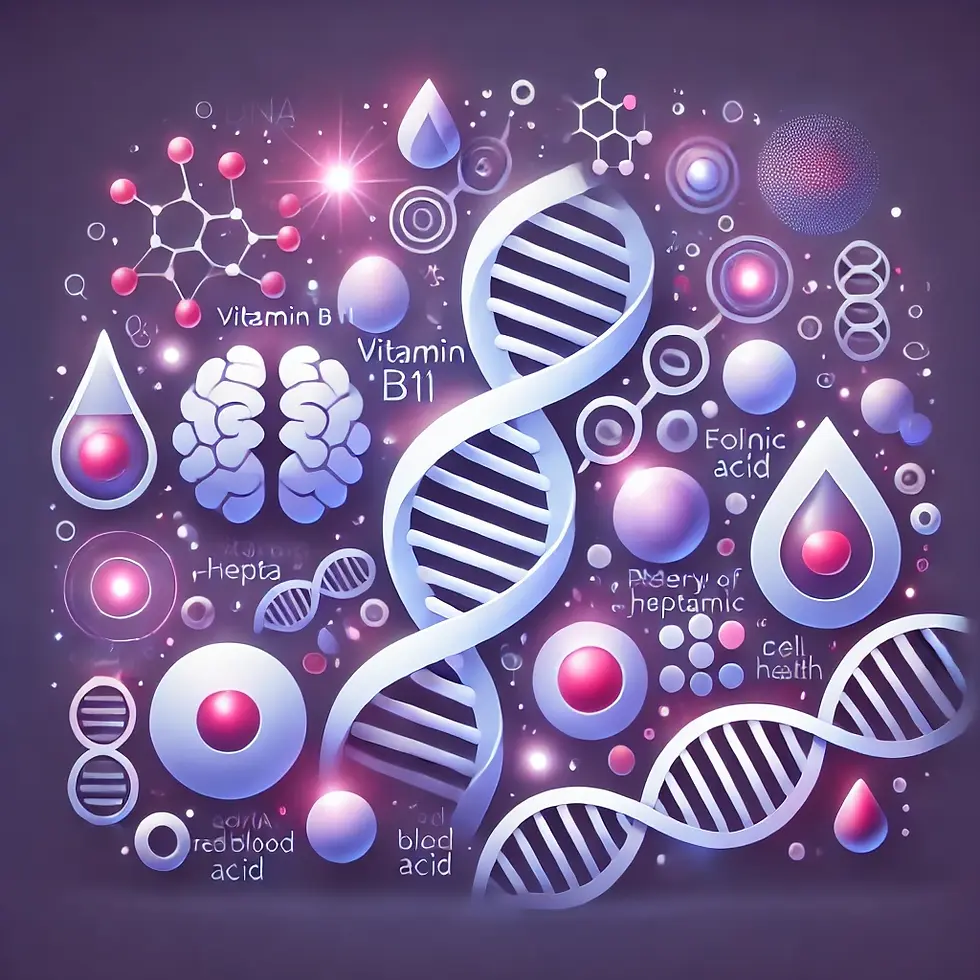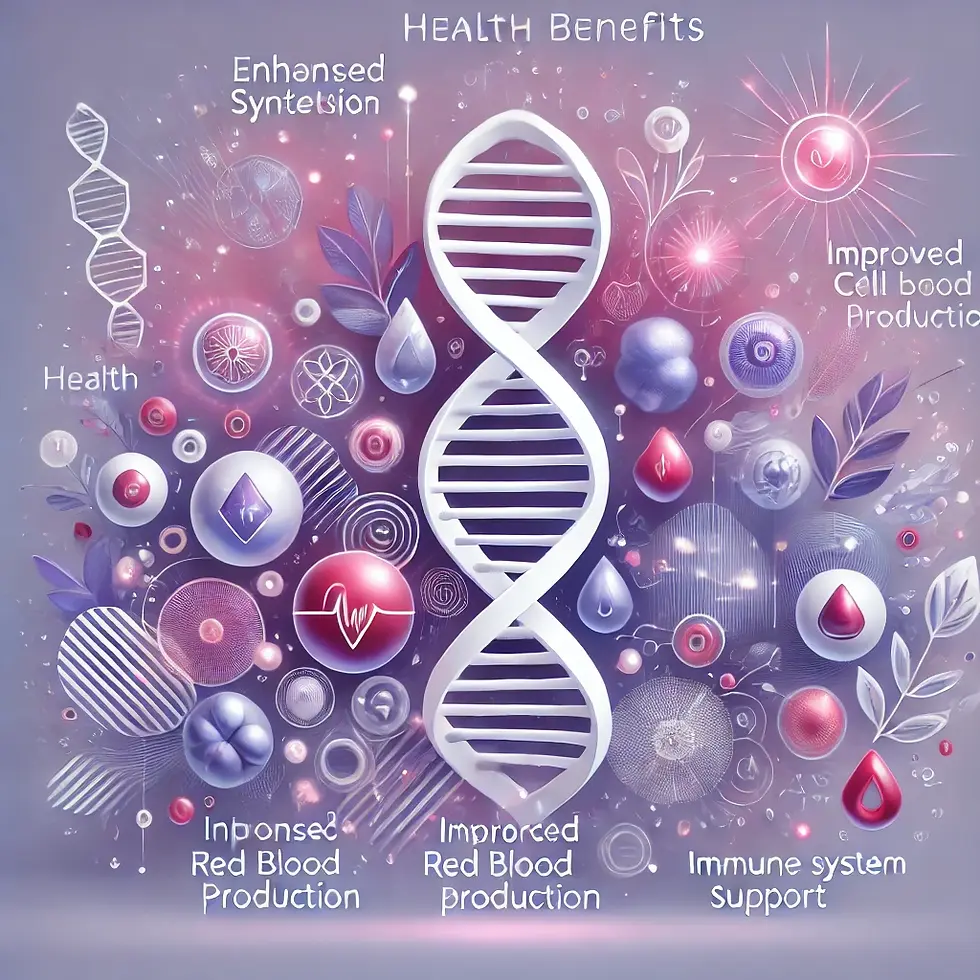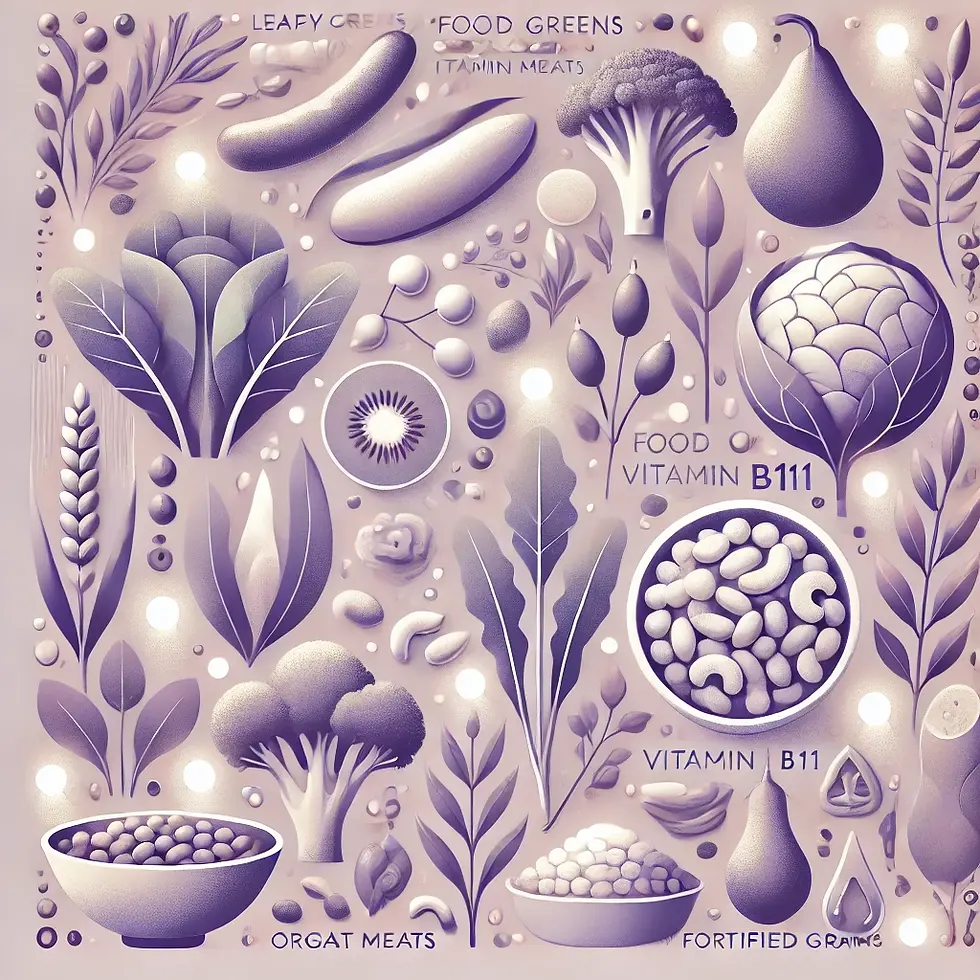
Vitamin B11 (Pteryl-hepta-glutamic Acid or Folinic Acid): The Supporter of DNA and Cell Health
- Jan 25
- 3 min read
Updated: Jan 26
Vitamin B11, also known as folinic acid, is a derivative of folic acid (Vitamin B9). While not officially categorized as a standalone vitamin, it plays a crucial role in cellular metabolism and DNA synthesis. Folinic acid is especially important in specific medical applications and is often used as a therapeutic supplement to enhance folate-dependent processes.
What Is Vitamin B11 (Folinic Acid)?
Folinic acid is the biologically active form of folate and is often used in medical settings to support individuals who cannot efficiently convert folic acid into its active form. It is involved in DNA synthesis, red blood cell formation, and overall cellular repair.

Functions of Vitamin B11
1. DNA and RNA Synthesis
• Like folic acid, folinic acid is crucial for the production of DNA and RNA, supporting healthy cell division and growth.
2. Red Blood Cell Formation
• It aids in the production of red blood cells, helping to prevent and treat anemia caused by folate deficiencies.
3. Enhances Methionine Production
• Folinic acid helps convert homocysteine (an amino acid) into methionine, a compound essential for protein synthesis and other bodily functions.
4. Drug Interaction Support
• Folinic acid is used medically to counteract the side effects of drugs like methotrexate, which inhibit folate metabolism.

Health Benefits of Vitamin B11
1. Supports Anemia Treatment
• Folinic acid helps in cases of folate-deficiency anemia by aiding in red blood cell production.
2. Protects Against Birth Defects
• Similar to folic acid, folinic acid can support fetal development by reducing the risk of neural tube defects during pregnancy.
3. Aids in Chemotherapy Recovery
• Folinic acid is used in combination with certain chemotherapy drugs, like methotrexate, to protect healthy cells and minimize side effects.
4. Improves Cognitive Function
• Adequate levels of folinic acid are associated with improved brain health and may help reduce symptoms of neurodegenerative diseases.
5. Reduces Homocysteine Levels
• By converting homocysteine into methionine, folinic acid helps lower homocysteine levels, reducing the risk of cardiovascular diseases.

Food Sources of Vitamin B11
Vitamin B11 is not typically found as a separate nutrient in food but is a form of folate, which is abundant in many foods.
Rich Sources of Folate/Folinic Acid
• Leafy Greens: Spinach, kale, and collard greens.
• Legumes: Lentils, chickpeas, and black beans.
• Citrus Fruits: Oranges, grapefruits, and lemons.
• Broccoli and Asparagus: Rich in natural folates.
• Fortified Foods: Cereals and grains often enriched with folic acid.
Recommended Dosage of Vitamin B11
The dosage of folinic acid depends on the individual’s medical condition. It is often prescribed by healthcare providers, particularly in the following cases:
• Chemotherapy Support: 7.5–50 mg daily to reduce drug side effects.
• Anemia Treatment: Doses are determined based on severity and folate levels.
Always follow medical advice for appropriate dosing.
Deficiency of Vitamin B11
Folinic acid deficiency is rare but can occur in individuals with certain genetic mutations (e.g., MTHFR mutation) or those taking medications that interfere with folate metabolism. Symptoms mirror those of folate deficiency and include:
• Fatigue and weakness.
• Difficulty concentrating or memory issues.
• Anemia.
• Poor growth or development (in children).
Can You Have Too Much Vitamin B11?
Folinic acid is considered safe at recommended doses, but excessive intake can mask symptoms of Vitamin B12 deficiency. This can delay diagnosis and lead to neurological complications.
Medical Applications of Vitamin B11
Folinic acid is primarily used in medical contexts, including:
1. Chemotherapy Support
• Folinic acid is administered alongside drugs like methotrexate to protect healthy cells.
2. Treating Genetic Conditions
• For individuals with MTHFR gene mutations, folinic acid supplements provide a direct, usable form of folate.
3. Anemia Treatment
• Folinic acid supplements are used to treat certain types of anemia caused by folate deficiencies.
Conclusion
Vitamin B11, or folinic acid, is a powerful nutrient that supports DNA synthesis, red blood cell formation, and overall cell health. While not officially a vitamin, its medical applications make it essential for specific conditions like anemia, chemotherapy support, and genetic folate metabolism issues.
If you think you might benefit from folinic acid or have questions about its use, consult a healthcare provider for personalized advice.
Would you like more information about B11’s role in medical treatments, supplementation options, or diet tips to boost folate? Let me know!



Comments